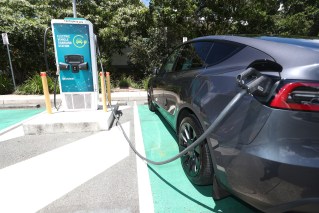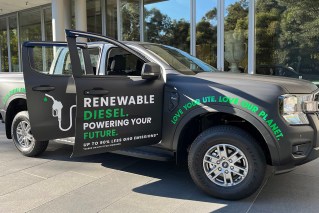First drive review: Holden Trax
For years Holden knew it had a missing link. While makers such as Subaru with the XV and Toyota with its Rav4 had a strong presence in the compact SUV market, Holden could only offer something a little bit bigger – the Captiva. Enter the Korean-built Trax, which ironically during our drive was mistaken for a Captiva more than once. The Trax is based on the floorpan of the Barina but then gets a more bulbous body and vastly increased ground clearance but no four-wheel drive option, despite looking like a baby off-roader.
There are two models in the range, the five-speed manual LS (also available with an automatic transmission) and six-speed automatic geared LTZ. Holden engineers had input into both suspension tune and the manual gear ratio points. The LTZ has the highest equipment list, including leather seats and a more comprehensive trip computer (pictured). Both models are five-door and both use a 1.8-litre petrol engine driving through the front wheels and producing 103kW at 6300rpm and 175Nm of torque at 3800rpm. There is no diesel option.
The Trax certainly has a presence out on the road, though to me it looks a little too narrow, but, in all fairness, that’s not a feeling you get inside where shoulder room is pretty impressive and front headroom is okay. The cabin is all well screwed together and quality of fit and finish is absolutely fine.
Boot space is quoted at a minimum 356 litres, rising to 785 litres with the seats folded and 1370 litres with what Holden calls, seats folded to the roof. Basically you can fold the rear seats right back to the front set-backs. With the seats in place it is a hard ask to get luggage for four or five stowed, especially given the load floor is relatively high off the ground so cutting down on useable space. The plus is that it’s easy enough to slide heavy items in and out because you’re not bending into the boot too much.
The front seats are comfy enough, though a tad small on under thigh support. Ditto for the rear bench, with the additional point that anyone sitting in the middle will not be overly comfortable – it’s tight even for three 10-year-olds (I know, I tried it). The seat base is also quite small so under-thigh support is certainly not class-leading; it’s okay but on a long run adults can become uncomfortable and fidgety.
The LS is not so well equipped though it does still have the seven-inch screen and reversing camera, rear park sensors, leather clad steering wheel, cruise control and Bluetooth phone and audio streaming, as well as auto headlamps, so it’s not bad at all. The LTZ has leather seats and a more comprehensive computer system providing more info.
The biggest minus for me is the Trax’s engine which is not as smooth revving as you might expect from a modern unit of this size. In automatic form it can sound positively harsh when pushed, for example when pulling away from traffic lights or accelerating to merge with traffic, and the like. The Trax does have a decent amount of poke, that’s for sure, but it definitely comes at the expense of engine noise and refinement.
The Holden Trax is miles better in manual form thanks to a slick and light-shifting gearbox which allows you more engine flexibility, by which I mean you can push it hard without feeling like you’re murdering the engine, simply because you will naturally change up gears earlier than the auto does. I got 8.0L/100km out of the manual Trax and 8.6L/100km from the auto, so not a lot of difference there but it’s a fair bit higher than the combined 7.0L/100km that Holden quote for the LS and 7.6L/100km for the LTZ, and for this size of vehicle that’s a fairly high consumption figure.
The ride is firm but not too choppy – which is good news because some smaller high-riding SUVs cannot manage that combination of firmness and a decent ride. You can point the Trax into corners quickly without too much body roll or any other drama. Levels of grip are high, considering the Trax is quite tall, and it never feels in danger of toppling over, indeed it always feels very stable on the road.
PRACTICAL MOTORING VERDICT
At $23,490 (all models, plus ORC) for the LS manual, $25,690 for the LS auto and $27,990 for the LTZ automatic, the Holden Trax is sensibly priced but it is up against some very stiff – and well established – competition. With a better engine the Trax would be in a far better place when it comes to taking on rivals. That, and not pricing, equipment or looks, is the one thing that may well hold it back.
HOLDEN TRAX
PRICE from $23,490 (plus ORC)
WARRANTY three-year, 100,000km
SAFETY RATING five-star
ANCAP ENGINE 1.8-litre 4-cylinder petrol
POWER/TORQUE 103kW/175Nm
TRANSMISSION 6-speed manual, or 6-speed auto
BODY 4.28m (L) 1.77m (W) 1.67m (H) WEIGHT 1367-1371kg THIRST 7.0-7.6L/100km (combined)
This article first appeared in Practical Motoring.








